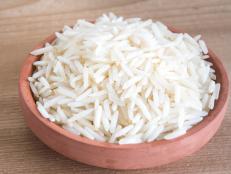6 Common Calorie Myths You Need to Stop Believing
No, "negative calories" are not a thing.

Tetra Images - Jamie Grill/Getty Images
When it comes to weight and weight loss, there are a lot of factors at play. For many people, the first thing that comes to mind is calories. How many should you be eating? What calorie count is best for weight loss? What even is a calorie?! What’s a calorie deficit and do I need to be in one?
While it’s important to be aware of your caloric intake, obsessing over calories isn’t healthy — and neither is believing gimmicky tropes like “calories in vs calories out.” Nutrition and calorie counting is much more nuanced and depends on a variety of factors like lifestyle, age, genetics and more. If you find yourself relying on catchy phrases or outdated ideas about calories, you probably believe one of these common calorie myths. Keep reading to set the record straight for the future.
Myth One: A calorie is a calorie.
Accurate? Kind of.
Let’s start with the basics: A calorie is a unit of energy. Calories in food give you energy, whether that food is a carbohydrate, protein, or fat. In this sense, all calories are equal, but how those calories affect the body is not the same.
When you consume calories from carbohydrates, your body metabolizes them differently than the same amount of calories from fat or protein due to the thermic effect of food (TEF). TEF describes the extent to which energy is expended (how many calories are burned) given the metabolic requirements to digest and absorb a specific food. Basically, you’ll burn more calories digesting certain foods compared to others.
The thermic effect of each macronutrient is as follows: Fat: 2–3%, Carbs: 6–8%, Protein: 25–30%. If you consume 100 calories of protein, which has roughly a 25% thermiceffect, you absorb about 75 calories, and 25 calories are utilized to metabolize that protein. If you eat 100 calories of carbs and the thermic effect is 7%, you absorb about 93 calories and use 7 calories for the metabolism of that food. Keep in mind the numbers may not be exact, but, in general, it takes more energy to metabolize protein than carbs or fat. When trying to lose weight, a diet composed mostly of lean proteinand whole foods rather than processed ones gives you more bang for your metabolic buck.
Speaking of processed foods: It’s important to mention that the TEF of carbs varies a lot, too, based on whether or not the carb-containing food is high in fiber or processed and stripped of fiber. Think about white bread versus whole wheat bread: Because the white bread has been stripped of fiber and protein during processing, your body doesn’t have to do much work to break it down. (The work was literally done at the processing plant.) When it comes to whole wheat bread, your body has to do a lot more work to digest each bite because the protein and fiber are present. You want to put your GI tract to work.
Myth Two: Calories In Vs Calories Out leads to weight loss.
You may have heard the term “calorie deficit” when it comes to weight loss. Calories “in” refers to the amountof energy you get from food, while calories “out” refers to the amount of energy you burn. We burn energy in three ways to make up our Total Energy Expenditure (TEE) each day:
- Basal Metabolic Rate (BMR): The amount of energy used to sustain life (AKA the energy used to fuel your lungs to breathe, your heart to beat and pump blood, etc.)
- Thermic Effect of Food (see above)
- Physical activity
A “calorie deficit” is reached when your calories-out exceeds your calories-in. Do you need to bein a calorie deficit to lose weight? YES. You cannot achieve weight loss unless you are in a calorie deficit.Is weight loss as simple as that? NO.
First of all, there are many other factors involved in achieving weight loss including underlying conditions (e.g., hypothyroidism) or a history of crashing dieting, which can alter and slow your metabolism. This is where talking to a Registered Dietitian can come in handy — we’re well-versedin individualizing your eating pattern around health conditions and/or history of yo-yo dieting in order tohelp you achieve your weight loss goals!
Second, “calories in, calories out” fails to consider the type of foods we eat and their impacton our body. The foods you consume can affect hormone functioning, inflammation, hunger/fullness feelings, and disease states, all of which affect weight status. For example, diets high in saturated fat and processed sugar are shown to increase inflammation, cholesterol, blood sugar levels, insulin resistance,and risk of metabolic syndrome, all of which are factors that impede weight loss goals. Certain foods also affect hunger and satiety. For example, simple sugars like fructose are absorbed rapidly by your cells leading to a blood sugar spike and crash and hanger not long after eating, whereas fiber is digested much more slowly, keeping you fuller for longer.
Same goes for food pairings: Pairing protein and healthy fat with your carbs will ensure you stay fuller longer reducing the urge to overeat later on. If your “calories in” is made up mostly of processed foods, saturated fat, and simple carbohydrates, you’re you’re probably setting yourself up for future weight gain and health complications like heart disease and diabetes. When it comes to the calories you put in, the source matters (just like where you get your nutrition advice from)! Don’t sabotage your future health by going with the idea that the only thing that matters is a calorie deficit.
Myth Three: You should aim for 1,200 calories a day to lose weight.
Let me say this loud for the people in the back: A 1,200 CALORIE A DAY DIET IS NOT HEALTHY OR SUSTAINABLE.
Many apps set the same target of 1,200 calories for everyone, which should be your first clue that they’re incorrect. Unless you’re a toddler (or the size of one), your daily needs are higher than this. This is considered a very low-calorie diet which, yes, can result in rapid weight loss, but has been proven to be unsustainable long-term as it slows down your metabolism, affects your hunger/fullness hormones, and is difficult to stick to. You end up gaining the weight back later and are left with an altered and slowed-down metabolism. This is how people end up on the yo-yo dieting rollercoaster. Please hop off and ignore these very low-calorie diets. Your body will thank you.
Myth Four: Negative calories.
Let me start with this: Any extreme food habit such as purposely eating celery all day in the hopes of weight loss is over-the-top and a sign of an unhealthy mindset around food and health, in general. Celery is low in calories and some calories are burned as it is digested. But again, TEF only accounts for about 5-10% of calories burned. Non-starchy vegetables and other foods like celery still provide you with calories (the thermic effect of food is not 100%) and do not result in “negative calories”.
Any time a diet asks you to focus solely on one food because it’s allegedly the golden ticket to weight loss because it’s “negative calories,” run for your life. Not to mention, if you’re only eating a few foods in large quantities, you are robbing your body of the important nutrients that come from other foods! Hello, nutrient deficiencies! While non-starchy vegetables are a key component to a balanced diet, they are not the only component. Don’t ignore protein and healthy fats just because someone on the internet said you need to eat “negative calories” in order to lose weight.
While we’re here, I’d like to take this time to call out one of the most frustrating fads on the market — the celery juice fad diet. Just no. Just eat the celery to get the fiber that the juice totally strips away. Why is celery juice a thing?
Myth Five: Empty calories.
So, this isn’t a totally myth. The term “empty calories” refers to foods with high calorie content but low nutrient content, meaning they’re lacking in important nutrients like fiber, protein, vitamins, and minerals. Basically, they are foods that provide calories, but don’t provide any other useful things your body needs and won’t fill you up, which is not so great for weight loss.
Let’s think about 500 calories from a plate with kale sauteed in olive oil, chicken, and some sweet potato versus 500 calories from candy. Either way, you are consuming 500 calories, but the 500 calories from the candy gives you nothing but calories and simple, processed sugar. That sugar gets absorbed rapidly, spikes your blood sugar, then you experience a “sugar crash,” making you feel hungry again not too long after. The plate of kale, chicken, and sweet potato contains a fiber, protein, healthy fats, and a whole lot of vitamins and minerals. This meal will take time to digest, it won’t send your blood sugar up to the moon, and it’ll keep you feeling full until your next meal reducing the urge to overeat.
The lesson here: Limit your intake of empty calorie foods and, instead, choose foods that are nutrient dense like whole grains, fruits high in fiber, starchy and non-starchy vegetables, lean proteins, and unsaturated fats. You don’t need to cut these empty calorie foods out altogether. Consider eating them after you’ve had a balanced meal. (Think: a fiber and protein-packed breakfast before that doughnut.)
Myth Six: Don't count calories, count macros.
You need to be in a calorie deficit to achieve weight loss, period. If weight loss is your goal, counting calories, or at least being aware of calories, is important as it’s very common for people to underestimate the amount of calories they’re actually eating and/or overestimate the amount of calories they’re actually burning.
Do you need to count macros? Depends on your goals! We need all macronutrients—protein, carbs, and fat. Generally speaking, you should aim for 45-65% of daily calories to be from carbs, 25-25% from fat and 10-30% from protein. This can vary a bit with certain medical conditions, but it’s the general rule. If you are in a calorie deficit and hovering near these ranges, you will achieve weight loss while meeting your daily nutrient needs.
When it comes to weight loss, calorie counting is king. But when it comes to overall health and body composition, macronutrients and the source of your calories are important.
Bottom Line: You need to be in a calorie deficit to lose weight.
Calories in vs calories out does not take into account overall health or the effect different foods have on your body. Weight is a determinant of many other things such as physical activity level, predisposed conditions with hormonal and metabolic dysfunction, genetics, and type of food consumed. Losing weight and losing fat are two separate things. Your health goes far beyond calorie count. Your weight goes far beyond a number on the scale (think: body composition, inflammation, water weight). And, most importantly, your worth goes far beyond your body size!
Vanessa Rissetto received her MS in Marketing at NYU and completed her Dietetic Internship at Mount Sinai Hospital where she worked as a Senior Dietitian for five years. She is certified in Adult Weight Management (Levels I & II) by the Academy of Nutrition and Dietetics, and the founder of Culina Health. Her work in private practice also includes treatment of GI disorders, bariatric surgery, weight management, PCOS, and family nutrition. She loves helping clients take an active role in their health journey, motivating them and ensuring that they always achieve success. Vanessa was named by one of the top 5 black nutritionists that will change the way you think about food by Essence magazine. Vanessa lives in Hoboken NJ with her husband, two kids and their new goldendoodle Freddie. An exercise enthusiast, she is always up for a class as long as it's after she rides her Peloton.
*This article was written and/or reviewed by an independent registered dietitian nutritionist.
Related Links:

































